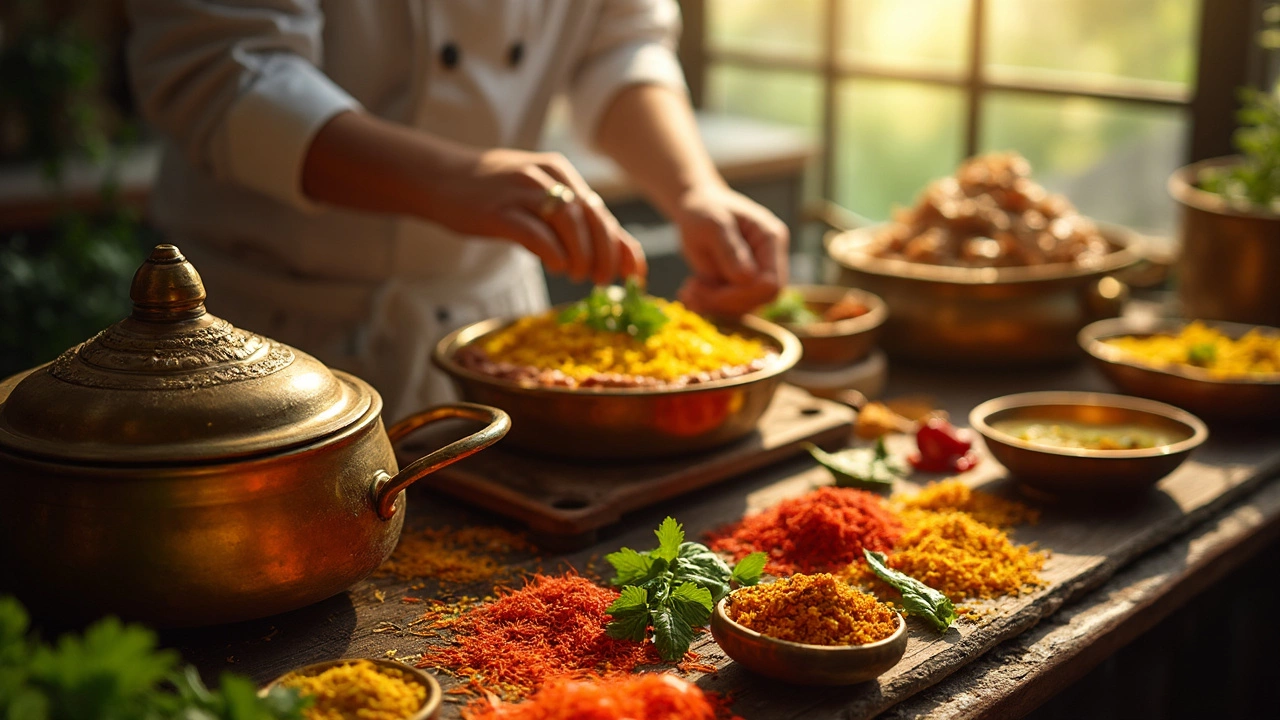Why Biryani Takes So Long to Cook
 Mar, 28 2025
Mar, 28 2025
Ever wondered why your biryani sessions seem to stretch endlessly? Well, you're not alone. Cooking biryani isn't just about throwing ingredients in a pot; it's about crafting layers of flavor. Think of it like building a flavorful masterpiece, where each ingredient plays its part in creating that heavenly aroma and taste.
First, there's the process of layering. They'll have you slice onions just right, sauté spices until they sing, and ensure every grain of rice is perfectly coated. The magic happens when everything is slowly cooked together, allowing flavors to meld beautifully. Yes, it's a bit like an orchestra performance.
Why so long, though? The secret lies in letting the ingredients get cozy. Marinating meat takes its sweet time, but it makes the tenderness worth the wait, right? Give the rice some soaking time too—trust me, it helps!
But hey, nobody's got endless hours to spare. So, stick around—I’ve got a few tricks up my sleeve to quicken the pace without skimping on flavor. You'll soon master the art of biryani without watching the clock all day. Ready to unlock the secrets?
The Art of Layering
Alright, let's jump into what many say is the heart of biryani preparation: layering. Imagine putting together a puzzle, where each piece must fit perfectly, except here, it’s about getting those flavors just right. This isn’t just for show; the technique deeply influences the taste and aroma of your biryani.
So, what’s the deal? Well, it all starts with preparing each ingredient so they can shine in the final dish. Start with the basics—a good base layer of flavorful, sautéed onions is crucial. You'll want them golden brown, bringing sweetness and depth. Don't rush this part. Think of it as setting the stage for a delicious play.
Next, we add marinated meat. Let it snuggle right onto those onions. This step is why marination time is a must, allowing the meat to soak up spices and yogurt, making it tender and juicy.
Now, the rice. Here’s a golden tip: parboil your rice with a hint of saffron or rose water. Only halfway cooked, it’ll finish cooking while layered, soaking in all of the biryani’s magical flavors. Then, layer it carefully over the meat. If you're feeling fancy, sprinkle some fried onions or nuts for extra crunch.
You’d typically stack things up like a sandwich, alternating layers of meat and rice, ensuring the ingredients get a chance to blend. Some folks add herbs like mint and coriander at each level, which adds a fresh hint to the blend.
Slow-cooked biryani works best when flavors are coaxed out during the final simmer—it's the payoff you've been waiting for. The layers fuse together, making no bite the same. And guess what? This slow-cooking process not only brings out complex flavors but also makes it easier to maintain the biryani’s moisture.
Remember, biryani isn’t a one-pot-wonder just thrown together. It’s about careful crafting and thoughtful placement. When your biryani cooking is fueled by patience and attention to detail, every bite becomes an ode to your culinary skills!
Importance of Marination
Alright, let's talk about marination and why it's a superstar in the biryani process. Picture meat as a blank canvas. Now, the marinade is your vibrant palette. Marinating isn't just a mild suggestion; it’s essential for biryani's mouth-watering taste.
So, what’s the deal with marinating? It comes down to a delicious blend of spices, yogurt, and sometimes tenderizers like lemon juice. This mix does wonders—it not only infuses flavor but also breaks down proteins making the meat juicy and tender. Some say good things take time, and marination is exactly that. Give it at least a couple of hours, but if you're brave (and patient) enough, overnight marination is the gold standard!
- Biryani preparation starts with the right spices. Turmeric, cumin, garam masala—these are just the beginning.
- A good marinade makes the difference between blah and wow. That's why skipping this step could leave your biryani high and dry.
- Don't rush it; let the flavors mingle and party. That’s when the magic happens.
If you want to compare it, check out this little data nugget from a kitchen survey: 70% of home cooks said their biryani dramatically improved with at least 4 hours of marination. You're turning that meat into a flavor sponge!
So next time you're tempted to skip or shorten the marination, remember, that's like starting a movie and skipping all the build-up. It's just not worth it. Trust the process, and your biryani will thank you for it!

Slow-Cooking Magic
Alright, so what's the deal with slow-cooking and biryani? If you’ve noticed that the best biryani tends to require some patience, there's a good reason for that. Slow-cooking isn't just a fancy technique; it's where the real magic happens. It’s like giving a fine wine time to breathe.
When you're making biryani, especially the traditional versions, low-and-slow is the way to go. Why? Because it allows the flavors to blend perfectly. Cooking at a lower temperature gives the spices plenty of time to infuse the meat and rice, making sure every bite is packed with rich, aromatic goodness. This is one of the reasons a good biryani recipe instructs you to keep the flame low.
Think about the 'dum' cooking method often associated with biryani. You seal the pot with dough or a tight-fitting lid so that the steam stays inside. This not only ensures even cooking but also locks in moisture, preventing the biryani from drying out. You'll often find that the rice remains tender, while the meat becomes melt-in-your-mouth soft.
But don’t underestimate the role of patience in this. Imagine you're preparing a slow-cooked biryani with marinated chicken. You’ll want everything bathed in spices and cooked just right, which takes a bit of time. However, you can ensure efficient cooking by using a heavy-bottomed pan to avoid any burning or sticking, something that's crucial for a perfect biryani cooking time.
Here's a simple trick: if time's really tight, some people partially cook the rice and meat separately before slow-cooking them together. Just be careful to adjust the cooking time, so you don't end up overcooking.
Remember, when it comes to biryani, slow-cooking is a friendly reminder that good things come to those who wait. So next time you're tempted to crank up the heat, just take a breath and let your biryani do its thing.
Tips to Speed Up the Process
We all love a good biryani, but waiting forever? Not so much. Here are some simple tricks to help cut down the cooking time without losing those rich flavors we crave.
First off, let's talk marination. Try marinating your meat overnight. Not only does this save precious minutes on the day you're cooking, but it also makes the meat significantly more flavorful and tender. If you're in a rush, you can use a fork to pierce the meat a bit, helping the marinate sink in quicker.
When it comes to rice, soaking is your friend. Giving your rice a soak for at least 30 minutes can cut down on the cooking time significantly. While it soaks, you can get other prep work out of the way.
Now, the cooking sequence makes a big difference too. Instead of cooking your biryani in one go, consider parboiling the rice separately. This means cooking it until it's about 70% done, so when you layer it with the meat, it needs less time to finish cooking.
Spice aficionados might want to make their spice mixes ahead of time. Store them in airtight jars. This way, you're not rummaging through the spice cabinet, searching for the cumin or trying to remember the precise mix ratios.
Using a pressure cooker is another fantastic way to quicken your biryani cooking time. With modern technology, there are electric pressure cookers that offer settings specifically for rice and biryani, speeding things up even more.
- Marinate overnight or puncture meat for faster infusion.
- Soak rice for 30 minutes before cooking.
- Parboil rice for 10-12 minutes for quicker layering.
- Prepare spice mixes in advance for easy use.
- Consider using a pressure cooker for faster cooking.
Remember, the key to a quicker biryani isn't about skipping steps—it's about being smart with your time. Cooking biryani doesn't have to mean spending the entire day in the kitchen!